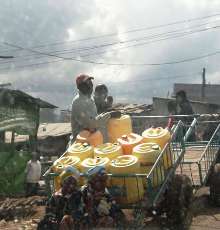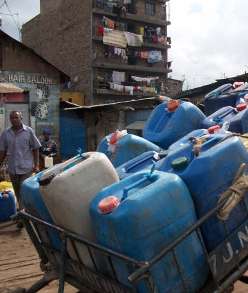|
|
|
|
 |
|
How Faith schools & Water started
 |
 |
 |
The water issue is very broad and very complex. It affects billions of people, the problems are horrendous. Picture from Mathare, Kenya |
Download the free Faith in Water book.
Salisbury, England July 5-7, 2009.
Water, sanitation, children and faith were the focus when religious leaders, theologians, educators, environment/development specialists, water sanitation experts and innovators met for the first ever workshop on Faith and Water in Salisbury’s Sarum College from July 5th – 7th July. Link here for the news report of the conference and here for the inspiring presentations in full.
The immediate goal was to produce a useful guide to help faiths and secular groups work together to protect water resources and the environment, to preserve hygiene and promote the safe management of water and waste, specifically in the context of schools. In the longer term the meeting was intended to forge strong partnerships and reinforce the faiths’ ability to help communities improve their water facilities for many years to come, and encourage international secular agencies to see them as natural partners – something that has not happened before.
 |
 |
 |
"The water issue is very broad and very complex. It affects billions of people, the problems are horrendous," (Founder of EMF, Allerd Stikker).
Water cleans the body, and by extension purifies it, and these two main qualities confer a highly sacred status on water. This is reflected in the way people use water, in the way they design water systems and the need for accessibility of water for cleansing after toilet use or washing hands. |
Why Faiths and Water?
Linking faith with water facilities and school toilets does not sound like an obvious step, yet it is important. Water is central to many religions: as the source of life, it often represents birth and rebirth. It cleans the body, and by extension purifies it, and these two main qualities confer a highly sacred status on water. This is reflected in the way people use water, in the way they design water systems and the need for accessibility of water for cleansing after toilet use or washing hands.
Water provision for drinking, hand washing, flushing, cleaning, school meal preparation and the provision of clean toilets and urinals in schools are vital to keep children healthy. Anybody with children in school knows that schools are places where children get infected. They are places where many children gather in often cramped spaces with limited ventilation, bad hygienic conditions, no hand washing. A study in Colombia showed a direct link between diarrhoea and hygiene in schools: more than 40% of cases in schoolchildren were transmitted in school rather than at home. Here are more reasons for this meeting happening now:
Participants
Seven key traditions were represented: Buddhists, Catholics, Hindus, Jews, Muslims, Protestants and Zoroastrians, from 15 countries. For each there was a theologian as well as somebody working practically in the field. Faith in Water was attended by top water experts from UNICEF, UNDP, the World Bank, DFiD and the Dutch Government’s development organisation, DGIS. Working directly with faiths in this way was a novelty to many of them.
An unusual aspect of this conference was the role of innovators. Three were invited to talk about some of the entrepreneurial advances in water and sanitation in developing countries, and to inspire others to think and act creatively. For example Henk Holtstag talked about Smart Techs – simple technological solutions - including the ceramic Filtron Filter (made by Potters for Peace, and eliminating bacteria and turbidity), rope pumps (there are 80,000 of them transforming lives of 3 million people), and Tippy Taps for washing hands in schools (costing less than £3/unit)
Organisers
The event was cohosted by ARC with the Dutch Ecological Management Foundation (EMF) and the International Water and Sanitation Centre (IRC). EMF is an ecological body with a particular focus on water. IRC specifically works on water, sanitation and hygiene and as a centre brings 40 years of experience to the conference. The conference will take place in the delightful surroundings of Sarum College beside Salisbury Cathedral: a Christian ecumenical study research centre which prides itself on being an eco retreat centre, setting targets for sourcing food and energy locally.
The Naiade and Water Artefacts on Display
Many participants brought ritual objects connected to water. We also had a Naiade water-filtering unit on display in Salisbury Cathedral - which made a wonderful companion to the drama of the new font by William Pye.
The Naiade is a blue box about the shape (and half the size) of a Tardis, which works with solar energy and no chemicals to filter up to 2,500l drinking water a day. It is manufactured by Clean Water Now. Each Naiade costs around £3,500 and lasts for more than 10 years; it is operational in 27 countries, with many schools paying through micro-credit. A child can have 2.5l drinking water a day, for less than 1p a week.
CONTACT
Mary Bellekom mary.bellekom@arcworld.org +44 1225 758004
|
 |
|
|
|
|
|
 |
June 4, 2009:
Pray and Engage: the Archbishop of Canterbury advises Anglicans to act for nature
"I think there are two things we can do. We can, and we should, pray. Climate change is not only an environmental issue - probably the most important we face; it is also an issue of justice... The second thing we can do is get involved in the preparations for Copenhagen." Archbishop Rowan Williams |
 |
Education and Water
ARC's programme linking faith schools with water and sanitation issues started in 2009. Now we are working with UNICEF and other bodies to help children have better access to clean water |
 |
 |
|
|

